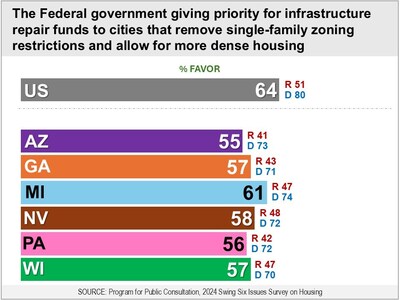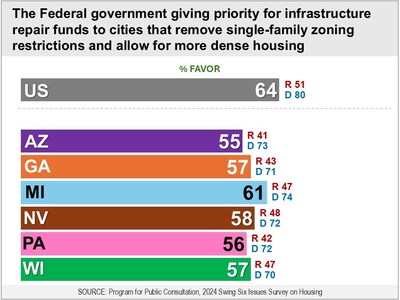In Swing States Bipartisan Majorities Favor Federal Government Actions To Make Housing More Affordable

COLLEGE PARK, Md., Oct. 22, 2024 /PRNewswire/ -- As housing affordability has become a major issue for many Americans, a new survey by the Program for Public Consultation (PPC) in six swing states and nationally finds majority support – bipartisan in most cases – for the Federal government taking a variety of actions to make housing more affordable, especially for low and middle-income households. These include:
- providing billions in grants and tax incentives for building and repairing affordable homes
- providing down payment assistance to first-time buyers
- reducing large corporate ownership of houses
- incentivizing local governments to reduce single-family zoning restrictions
- increasing the number of public Housing Vouchers
Steven Kull, Director of PPC noted, "In the swing states, bipartisan majorities want the Federal government to pursue an active and multi-pronged approach to deal with the high cost of housing."
This survey is the tenth, and last, in a series – the Swing Six Issue Surveys – being conducted in the run-up to the November election in the swing states of Arizona, Georgia, Michigan, Nevada, Pennsylvania and Wisconsin, as well as nationally, on major policy issues. Unlike traditional polls, respondents in a public consultation survey go through an online "policymaking simulation" in which they are provided briefings and arguments for and against each policy proposal. All Americans are invited to go through the same policymaking simulation as the survey sample. [More Detailed Report]
New Federal Spending and Tax Incentives for Affordable Housing
Respondents were informed that the Federal government currently provides some funding and tax incentives for building more affordable homes, mostly for low-income households. They were told that housing is considered affordable when it costs the household no more than 30% of their income to live there.
They then evaluated a series of proposals for the Federal government to do more to increase the supply of affordable homes. Each one is favored by bipartisan majorities in every swing state and nationally.
- $40 billion to build or repair housing affordable to very low and low-income households, through 1) grants to cities and states, and 2) support for more low-interest loans to home builders, is favored by majorities in every swing state (69-73%). This includes majorities of Republicans (57-63%) and Democrats (79-89%). Nationally, a bipartisan majority is in favor (74%, Republicans 63%, Democrats 86%). [BAR GRAPH]
- $25 billion to build or repair housing affordable to low and middle-income households, through grants to cities and states, is favored by 66-73% in the swing states, including majorities of Republicans (54-60%) and Democrats (80-86%). Nationally, a bipartisan majority is in favor (71%, Republicans 57%, Democrats 88%). [BAR GRAPH]
- A tax credit for building or repairing housing to be rented, on the condition that 60% of them are affordable to middle-income households, is favored by 69-73% in the swing states, including majorities of Republicans (56-64%) and Democrats (79-86%). Nationally, a bipartisan majority is in favor (73%, Republicans 63%, Democrats 85%). [BAR GRAPH]
- A tax incentive for building or repairing housing that is affordable for low and middle-income people to purchase–specifically in low-income, non-urban areas–is favored by 64-68% in the swing states, including majorities of Republicans (54-61%) and Democrats (73-79%). Nationally, a bipartisan majority is in favor (67%, Republicans 59%, Democrats 77%). [BAR GRAPH]
$25,000 Down Payment Assistance for First-Time Homebuyers
Providing assistance–up to $25,000–to help first-time homebuyers cover the down payment on a home, with more assistance for people whose parents never owned a home, is favored by majorities in every swing state (63-68%), including majorities of Democrats (81-87%). Among Republicans, a majority is in favor in Georgia (54%), views are closely divided in Arizona, Nevada, and Pennsylvania, and less than half are in favor in Michigan and Wisconsin (43-44%). Nationally, 67% are in favor, including 84% of Democrats, and a bare majority (52%) of Republicans. [BAR GRAPH]
Reducing Large Corporate Ownership of Houses
Respondents were informed that some experts believe the increase in large corporations purchasing houses accounts for some of the rise in home sale prices, while other experts do not. Two proposals for reducing large corporate ownership are favored by bipartisan majorities in the swing states and nationally:
- Requiring corporations with more than $50 million in assets to sell all their single-family houses, townhouses and duplexes within the next ten years, and prohibit them from buying any more, with substantial financial penalties for non-compliance, is favored by 66-71% in the swing states. This includes majorities of Democrats in each state (75-81%), as well as majorities of Republicans (57-63%) in every state except Wisconsin which is statistically divided. Nationally, a bipartisan majority of 67% is in favor (Republicans 55%, Democrats 81%). [BAR GRAPH]
- Denying corporations that own more than 50 single-family houses, townhouses or duplexes any Federal tax deductions related to their ownership of those houses (e.g. for mortgage interest or depreciation), is favored by 67-71% in the swing states. This includes majorities of Republicans (55-66%) and Democrats (78-81%). Nationally, a bipartisan majority of 71% is in favor (Republicans 61%, Democrats 82%). [BAR GRAPH]
Federal Incentives for Cities to Reduce Single-Family Zoning, and Allow More Dense Housing
Respondents were informed that, according to experts, one reason that housing has become less affordable is that local governments restrict building dense and mixed-use housing. They were told that the Federal government – when distributing funding for infrastructure repair – has started giving priority to local governments that allow more dense and mixed-use housing.
Asked whether they favor the Federal government continuing that policy, a majority in every swing state is in favor (55-61%), including majorities of Democrats (71-74%). Among Republicans, less than half are in support in Arizona, Georgia, and Pennsylvania (41-43%), while views are statistically divided in Michigan, Nevada and Wisconsin. Nationally, 64% are in favor, including 80% of Democrats, while Republicans are statistically divided (51% favor, 49% oppose).
Asked whether they would favor their own local government allowing for the construction of more dense and mixed-use housing, 61-70% are in favor in the swing states, including majorities of Democrats (79-83%). Among Republicans, majorities are in favor in Georgia, Nevada, Pennsylvania and Wisconsin (53-56%), while views are statistically divided in Arizona and Michigan. Nationally, a bipartisan majority of 68% are in favor (Republicans 54%, Democrats 84%). [BAR GRAPH]
Additional $24 Billion In Public Housing Vouchers
Respondents were informed that the government provides people who qualify for public housing – very low-income, disabled or elderly people – with Housing Vouchers that help cover rent in the private housing market. Majorities of 69-72% favor increasing the number of people who can receive Housing Vouchers by spending an additional $24 billion for that purpose, including majorities of Democrats (78-88%). Among Republicans, majorities are in favor in Arizona, Georgia, Nevada and Pennsylvania (58-64%), while they are statistically divided in Michigan and Wisconsin. Nationally, a bipartisan majority of 74% is in favor (Republicans 63%, Democrats 87%). [BAR GRAPH]
About the Survey
The surveys were fielded October 4-14, 2024 to a representative non-probability sample of 4,638 adults by the Program for Public Consultation at the University of Maryland's School of Public Policy, including approximately 600 adults in each state of Arizona, Georgia, Michigan, Nevada, Pennsylvania and Wisconsin, and 1,190 nationally. Samples were obtained from multiple online non-probability panels, including Cint, Dynata and Prodege. Sample collection and quality control was managed by QuantifyAI under the direction of the Program for Public Consultation. Samples were pre-stratified and weighted by age, race, ethnicity, gender, education, income, and metro/non-metro status to match the general adult population. The national sample was also weighted by marital status and home ownership. The national and most state samples were further weighted by partisan affiliation. The survey was offered in both English and Spanish. The confidence interval for the national sample is +/-3.2%, and for the state samples it ranges from +/-4.5% to 4.6%.
About UMD's Program for Public Consultation
The Program for Public Consultation (PPC) at the University of Maryland's School of Public Policy, develops and conducts public consultation surveys, seeking to improve democratic governance by consulting representative samples of citizens on key public policy issues. It shares its findings with officials in government, the media, other academics, and the general public.
![]() View original content to download multimedia:https://www.prnewswire.com/news-releases/in-swing-states-bipartisan-majorities-favor-federal-government-actions-to-make-housing-more-affordable-302282096.html
View original content to download multimedia:https://www.prnewswire.com/news-releases/in-swing-states-bipartisan-majorities-favor-federal-government-actions-to-make-housing-more-affordable-302282096.html
SOURCE Program for Public Consultation
© 2024 Benzinga.com. Benzinga does not provide investment advice. All rights reserved.
source
Breaking news
See all








